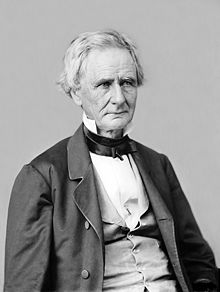This is an old revision of this page, as edited by The Mystery Man (talk | contribs) at 18:13, 6 January 2007 (→Quotations). The present address (URL) is a permanent link to this revision, which may differ significantly from the current revision.
Revision as of 18:13, 6 January 2007 by The Mystery Man (talk | contribs) (→Quotations)(diff) ← Previous revision | Latest revision (diff) | Newer revision → (diff)| Simon Cameron | |
|---|---|
 | |
| 26th United States Secretary of War | |
| In office March 5, 1861 – January 14, 1862 | |
| Preceded by | Joseph Holt |
| Succeeded by | Edwin M. Stanton |
| Personal details | |
| Born | March 8, 1799 Maytown, Pennsylvania, USA |
| Died | June 26, 1889 Maytown, Pennsylvania, USA |
| Political party | Whig, Democrat, Republican |
| Spouse | Margaret Brua Cameron |
| Profession | Journalist, Editor, Politician |
Simon Cameron (March 8, 1799 – June 26, 1889) was an American politician who served as United States Secretary of War for Abraham Lincoln from 1861 to 1862.
Early life
Cameron was born in Maytown, Pennsylvania, to Charles Cameron and Marth Pfoutz. He was orphaned at nine and later apprenticed to a printer, Andrew Kennedy, editor of the Northumberland Gazette before entering the field of journalism. He was editor of the Bucks County Messenger in 1821. A year later, he moved to Washington, D.C., and studied political movements while working for the printing firm of Gales and Seaton. He married Margaret Brua and returned to Harrisburg, Pennsylvania where he purchased and ran the Republican in 1824.
Cameron served as state printer of Pennsylvania from 1825 until 1827 and was state adjutant general in 1826. He constructed several rail lines and merged them into the Northern Central Railway. He founded the Bank of Middletown in 1832 and engaged in other business enterprises. In 1838, he was appointed as commissioner to settle claims of the Winnebago Indians.
Poltics
Cameron became a Whig Party member, and later a member of the Democratic Party, before being elected to replace James Buchanan in the Senate in 1844. He switched to the Republican Party and was nominated for President, but gave his support to Abraham Lincoln at the 1860 Republican National Convention. Lincoln, as part of a political bargain, named Cameron Secretary of War. Because of allegations of corruption, however, he was forced to resign early in 1862. His corruption was so notorious that Congressman Thaddeus Stevens, when discussing Cameron's honesty with Lincoln, told Lincoln that "I don't think that he would steal a red hot stove". When Cameron demanded Stevens retract this statement Cameron told Lincoln "I believe I told you he would not steal a red-hot stove. I will now take that back." He was succeeded by Edwin M. Stanton, who had been serving as a legal advisor to the War Secretary. He then served as United States Minister to Russia.
In 1866, Cameron was again elected to the Senate and served there until 1877, when on assurances from the Pennsylvania legislature that his son, James Donald Cameron would be the successor to his seat, he resigned. His son had already been named as Secretary of War in 1876.
Later life
Cameron retired to his farm at Donegal Springs near Maytown, Pennsylvania where he died on June 26 1889. He is buried in the Harrisburg Cemetery in Harrisburg, Pennsylvania. Cameron County, Pennsylvania and Cameron Parish, Louisiana are named in his honor.
Quotes
- "An honest politician is one who, when he is bought, will stay bought."
- "I am tired of all this sort of thing called science here... We have spent millions in that sort of thing for the last few years, and it is time it should be stopped." (on the Smithsonian Institute, 1861)
External links
- US Army: Simon Cameron
- Spartacus Educational: Simon Cameron
- Mathew Brady Studio: Simon Cameron
- biographic sketch at U.S. Congress website
- Biography at Lincoln Institute
- Mr. Lincoln and Friends: Simon Cameron
- Simon Cameron at Find A Grave
| Preceded byJames Buchanan | U.S. senator (Class 3) from Pennsylvania 1845–1849 Served alongside: Daniel Sturgeon |
Succeeded byJames Cooper |
| Preceded byRichard Brodhead | U.S. senator (Class 1) from Pennsylvania 1857–1861 Served alongside: William Bigler, Edgar Cowan |
Succeeded byDavid Wilmot |
| Preceded byJoseph Holt | United States Secretary of War March 5, 1861–January 14, 1862 |
Succeeded byEdwin M. Stanton |
| Preceded byCassius Marcellus Clay | United States Minister to Russia January 17, 1862–September 18, 1862 |
Succeeded byCassius Marcellus Clay |
| Preceded byEdgar Cowan | U.S. Senator from Pennsylvania 1867–1877 |
Succeeded byJ. Donald Cameron |

